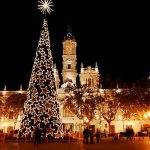Last updated on September 13th, 2019 at 09:09 am.
Do you like celebrating Christmas at home? Is your idea of the ideal Christmas one that involves your home hearth, slippers and a good helping of turkey? Or do your prefer to slip away and let someone else do all the donkey work?
Most people fall into one of two groups – those who want to be as far away from home as possible and those who don’t want to move a muscle out of the front door. The group you fall into can be influenced by the events of the year.
If you have experienced some kind of loss recently or suffered some other kind of tragedy, a getaway can seem like the ideal alternative. If you have property here, your getaway might be Spain.
The benefits of Spain at Christmas
The weather is usually milder at this time of year to that in many other parts of Europe. Even if it is not exactly beach weather, there is usually plenty of sunshine still and cracking open a bottle of bubbly on the beach on Christmas day is not out of the question.
Another advantage of Spain at Christmas is that you don’t have 24-hour selling of the Christmas experience. Where Christmas trees and trimmings do pop up early it is usually because there is a local expat community encouraging the habit.
The Spanish do celebrate Christmas but not with the fanfare and build up associated with other European countries. In Spain, Christmas Eve is the traditional time for present giving and family celebration. Christmas Day has more of the features of Boxing Day, with an emphasis on relaxation after the main event. In Spain, there is no bank holiday on the 26th December.
What Spain lacks in intensity at Christmas it gains in longevity. There are several key dates in the Spanish Christmas calendar:
December 22nd
The Spanish National Lottery – El Gordo – is drawn. The winning numbers are chanted during the course of the day by choirs of children.
December 24th
This is when the traditional Christmas dinner is eaten in the evening. This might then be followed by a trip to church for midnight mass (Misa del Gallo, Mass of the Cockerel) and villancicos or Christmas Carols might be sung.
December 28th
Día de los Santos Inocentes (Day of the Innocent Saints). This day has similarities with April Fool’s Day as people play tricks on each other.
January 5th and 6th
Los Reyes – January 5th is the night when the Three Kings bring Christmas presents to the children. This is a particularly important occasion that is celebrated in many towns by the ‘arrival’ of the Three Kings who proceed through the town and distribute sweets to the children. There is usually a ‘roscón de reyes’ somewhere to be enjoyed. This is a ring-shaped cake that conceals a small gift and is decorated with colourful sweets representing precious stones.
As with many celebrations, Christmas in Spain has become increasingly tinged with practices from other countries. For example, Father Christmas or Santa Claus is seen climbing up exterior walls as often as the Three Kings. However, Spain still remains a relaxing retreat from the hype and marketing frenzy.
Ideas for celebrating Christmas in Spain
It might be a little late to organise one of these activities for Christmas this year but why not think ahead and do something different in 2015:
A Benidorm Christmas
If you want an all-you-can-eat break away from the washing up then you could do worse than book yourself into an all-inclusive hotel in Benidorm for your Christmas break.
A Parador Christmas
The Paradors are a state-run hotel chain with hotels all across Spain and its territories. They are often based in old buildings that have been converted for use and guarantee a high standard of fixtures, fittings and attention.
There is a special Christmas Eve Package which includes Special Christmas Eve dinner, accommodation and buffet breakfast.
For more information from our website: Finding your own piece of Parador in Spain
A skiing Christmas
If you are missing the snow, that can soon be fixed. You are never too far away from a mountain range in Spain, the most famous of which is the Sierra Nevada in Granada. The Sierra Nevada has the advantage that you can base yourself in Granada itself and take the half hour journey up to the slopes.
No comments yet
There are no comments on this post yet.




Leave a comment